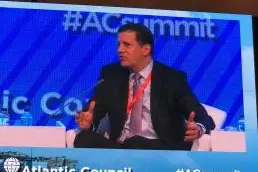PHOTO
Istanbul - As part of a distinguished panel for the 8th Annual Atlantic Council Istanbul Summit, Majid Jafar, Chief Executive Officer of Crescent Petroleum, the oldest and largest private oil and gas company in the Middle East, was pleased to share his observations and concerns about the developments in the energy industry, on the plenary session “Global and Regional Energy Outlook”, on the opening morning of the conference.
Jafar began by acknowledging that although global demand for oil is robust, the natural declines and depletion of the world’s oil fields are on-going, and this trend might be exacerbated with the lack of investment in the upstream sector due to a low commodity price environment. He reiterated that the world will still need oil and gas to meet the growing energy demand as oil, gas and coal account for approximately 86% of the global mix of energy usage. Currently, coal is a major environmental problem in many developing countries as it emits high levels of carbon dioxide, sulphur oxide and nitrogen oxide, all of which are the main cause of urban smog in many large Asian cities.
To battle such environmental consequences, Jafar reiterated his view on the need for the large-scale adoption of natural gas into the current energy industry to combat the environmental impact of coal consumption. He spoke at length about the importance of natural gas as a transition fuel, as most “renewables” (wind/solar) are intermittent in their supply and still need a gas-fired generation as a backup.
Jafar used the UK as a prime example on how switching to natural gas can reduce carbon emissions. He highlighted that UK’s CO2 emissions this year has fallen to the level last seen during the 19th Century due to the implementation of the Emissions Performance Standard (EPS). Simply put, EPS bans the production of electricity in the UK if it exceeds a certain amount. This effectively forces the closure of all existing coal plants by the mid-2020s when EPS rules are fully in effect. As a result, the UK is going through a major coal-to-gas shift in its primary energy mix, leading to lower carbon emissions.
Jafar highlighted a few crucial aspects of the energy market in the region, and commented that the new Trump administration in the US could affect the energy map of the world by more actively supporting the US energy sector.
Furthermore, Jafar noted that natural gas has become a key fuel for electricity and industry in the GCC Region in general and the UAE in particular. He advocated the need to push for innovation and entrepreneurship in order to diversify and engage natural gas while tackling the underlying subsidies and encouraging more investment as well.
In conclusion, Jafar emphasised the growing oil crisis and the estimated levels of unexplored natural gas reserves in the Middle East. Currently, there is an estimated 40% of total global gas reserves in the Middle East but only 17% of global production, which offers a unique growth potential for the region as a whole.
-Ends-
© Press Release 2017




















